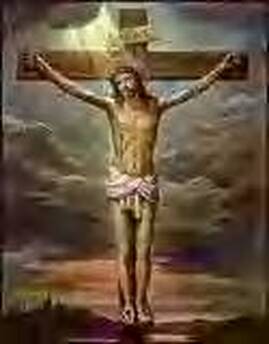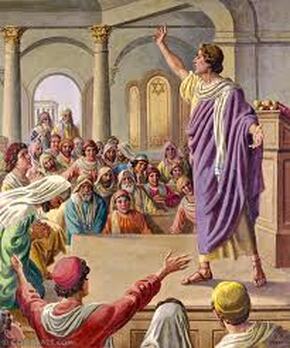1 Corinthians 1:10-31
Lesson 315
Read both the "King James Bible" and the "New Living Translation."
In this lesson:
Trouble in the church of Corinth.
Hint: Notice the different cliques.
True wisdom (1:18-25).
From this passage through verse 4:21 (lesson 318), dissension in the church and Paul's plea for unity.
Trouble in the church of Corinth.
Hint: Notice the different cliques.
True wisdom (1:18-25).
From this passage through verse 4:21 (lesson 318), dissension in the church and Paul's plea for unity.
Apollos preaching in Synagogue.
From The Classic Bible Art Collection.
From The Classic Bible Art Collection.
Who was -
Chloe -
Chloe was a Christian woman from Corinth. Someone from Chloe's household alerted Paul that the believers in Corinth were in disarray and quarreling among themselves. Not much else is known about Chloe.
Apollos -
Born in Egypt (Alexandria), Apollos was a Jew, scholar, gifted public speaker (Acts 18:24), missionary, teacher (Acts 18:24-28), and a friend of Paul's. Apollos preached in Corinth (Acts 19:1) and helped expand the church started by Paul (1 Corinthians 3:6). Tutored by Aquila and Priscilla, his powerful speaking style made Apollos so popular in Corinth that some Christians began to follow him instead of Christ. Rather than being flattered, this upset Apollos, and he was hesitant to return to Corinth (1 Corinthians 16:12). Apollos was with Paul in Ephesus when he wrote the "First Epistle to the Corinthians." Paul relied on Apollos and asked for his assistance in Nicopolis (Titus 3:13). Many biblical scholars believe Apollos wrote "The Epistle to the Hebrews."
Cephas -
Cephas is Aramaic for Peter, one of the original twelve disciples. It was Jesus who gave Peter the surname Cephas, meaning "rock" (John 1:42). Peter was the oldest of the twelve disciples. He was also called Simon Peter (2 Peter 1:1), Simeon (Acts 15:14), Simon Bar-jona (Matthew 16:17), or just Simon (Matthew 10:2). The Greek translation for Peter is Petros (meaning rock), and the Latin is Petrus. Peter was born in Bethsaida (John 1:44) on the northern coast of the Sea of Galilee. His father was Jona, also called Jonah or Jonas (Matthew 16:17; 21:15-17), and his younger brother was the disciple Andrew (John 1:40; 6:8). Peter was a simple fisherman in Capernaum (Matthew 4:18; Mark 1:16) and partners with James and John (Luke 5:10) when he met Jesus. Bold but uneducated (Acts 4:13), Peter (along with Andrew) became the first disciple (Matthew 4:18-20; Mark 1:16-18) and part of Jesus' inner circle. Whenever Jesus was in Galilee, He used Peter's home as His base. Peter wrote the First and Second Epistles of Peter (1 Peter 1:1; 2 Peter 1:1). He also walked on water (Matthew 14:28-31), performed the miracle at the Beautiful Gate (Acts 3:1-10), witnessed the Transfiguration of Jesus (Matthew 17:1-9; Mark 9:1-13; Luke 9:28-36; 2 Peter 1:16-18), the resurrection of Jairus' daughter (Mark 5:37-42), and Jesus praying in Gethsemane as He waited to be arrested (Mark 14:32-34). Peter rose up before the mob to resist Jesus' arrest (John 18:10-13), yet within hours denied even knowing Him three times (Matthew 26:69-75). After the crucifixion, Peter became the rock on which Jesus built His church (Matthew 16:16-19) and helped spread the Gospel from Jerusalem to Rome. Whenever the Bible lists the twelve disciples/apostles, Peter is always listed first (Matthew 10:2-4; Mark 3:16-19), and Roman Catholics consider him their first Pope. Peter was married (Matthew 8:14; Mark 1:30; Luke 4:38) and brought his wife on his missionary journeys (1 Corinthians 9:5). Although Jesus told Peter he would be crucified when he "shalt be old" (John 21:18-19), the Bible gives no details of his death. However, the Christian writers Quintus Septimius Florens Tertullianus (AD 160-220) and Origen Adamantius (AD 185-254) report that Peter was crucified upside down by Emperor Nero in Rome about AD 70, approximately three years after writing 2 Peter. In this passage, some Corinthian Christians follow Apollos, or Paul, while others preferred Peter's teachings. This created divisions within the church.
Crispus -
Crispus was the "chief ruler of the synagogue" in Corinth (Acts 18:8). He was one of the first Jewish religious leaders to convert to Christianity. We read in this passage that he was baptized by Paul (1:14). Some historians believe he later became the bishop of Aegina, one of the Saronic Islands of Greece.
Gaius -
A Macedonian (Greek) baptized by Paul (1 Corinthians 1:14). Gaius was from Derbe but lived in Corinth, where he made his home a gathering place for Christians. Paul stayed with Gaius when he wrote: "The Epistle of Paul the Apostle to the Romans" (Romans 16:23). Gaius traveled with Paul to Asia on the third missionary journey (Acts 20:4) and was attacked by an angry mob in Ephesus (Acts 19:29).
Stephanas -
A member of the Corinth church, he was one of the first Christian converts in the Achaia Province (1 Corinthians 16:15). He and his household were baptized by Paul (1:16) and "addicted themselves" to ministering to believers.
Chloe -
Chloe was a Christian woman from Corinth. Someone from Chloe's household alerted Paul that the believers in Corinth were in disarray and quarreling among themselves. Not much else is known about Chloe.
Apollos -
Born in Egypt (Alexandria), Apollos was a Jew, scholar, gifted public speaker (Acts 18:24), missionary, teacher (Acts 18:24-28), and a friend of Paul's. Apollos preached in Corinth (Acts 19:1) and helped expand the church started by Paul (1 Corinthians 3:6). Tutored by Aquila and Priscilla, his powerful speaking style made Apollos so popular in Corinth that some Christians began to follow him instead of Christ. Rather than being flattered, this upset Apollos, and he was hesitant to return to Corinth (1 Corinthians 16:12). Apollos was with Paul in Ephesus when he wrote the "First Epistle to the Corinthians." Paul relied on Apollos and asked for his assistance in Nicopolis (Titus 3:13). Many biblical scholars believe Apollos wrote "The Epistle to the Hebrews."
Cephas -
Cephas is Aramaic for Peter, one of the original twelve disciples. It was Jesus who gave Peter the surname Cephas, meaning "rock" (John 1:42). Peter was the oldest of the twelve disciples. He was also called Simon Peter (2 Peter 1:1), Simeon (Acts 15:14), Simon Bar-jona (Matthew 16:17), or just Simon (Matthew 10:2). The Greek translation for Peter is Petros (meaning rock), and the Latin is Petrus. Peter was born in Bethsaida (John 1:44) on the northern coast of the Sea of Galilee. His father was Jona, also called Jonah or Jonas (Matthew 16:17; 21:15-17), and his younger brother was the disciple Andrew (John 1:40; 6:8). Peter was a simple fisherman in Capernaum (Matthew 4:18; Mark 1:16) and partners with James and John (Luke 5:10) when he met Jesus. Bold but uneducated (Acts 4:13), Peter (along with Andrew) became the first disciple (Matthew 4:18-20; Mark 1:16-18) and part of Jesus' inner circle. Whenever Jesus was in Galilee, He used Peter's home as His base. Peter wrote the First and Second Epistles of Peter (1 Peter 1:1; 2 Peter 1:1). He also walked on water (Matthew 14:28-31), performed the miracle at the Beautiful Gate (Acts 3:1-10), witnessed the Transfiguration of Jesus (Matthew 17:1-9; Mark 9:1-13; Luke 9:28-36; 2 Peter 1:16-18), the resurrection of Jairus' daughter (Mark 5:37-42), and Jesus praying in Gethsemane as He waited to be arrested (Mark 14:32-34). Peter rose up before the mob to resist Jesus' arrest (John 18:10-13), yet within hours denied even knowing Him three times (Matthew 26:69-75). After the crucifixion, Peter became the rock on which Jesus built His church (Matthew 16:16-19) and helped spread the Gospel from Jerusalem to Rome. Whenever the Bible lists the twelve disciples/apostles, Peter is always listed first (Matthew 10:2-4; Mark 3:16-19), and Roman Catholics consider him their first Pope. Peter was married (Matthew 8:14; Mark 1:30; Luke 4:38) and brought his wife on his missionary journeys (1 Corinthians 9:5). Although Jesus told Peter he would be crucified when he "shalt be old" (John 21:18-19), the Bible gives no details of his death. However, the Christian writers Quintus Septimius Florens Tertullianus (AD 160-220) and Origen Adamantius (AD 185-254) report that Peter was crucified upside down by Emperor Nero in Rome about AD 70, approximately three years after writing 2 Peter. In this passage, some Corinthian Christians follow Apollos, or Paul, while others preferred Peter's teachings. This created divisions within the church.
Crispus -
Crispus was the "chief ruler of the synagogue" in Corinth (Acts 18:8). He was one of the first Jewish religious leaders to convert to Christianity. We read in this passage that he was baptized by Paul (1:14). Some historians believe he later became the bishop of Aegina, one of the Saronic Islands of Greece.
Gaius -
A Macedonian (Greek) baptized by Paul (1 Corinthians 1:14). Gaius was from Derbe but lived in Corinth, where he made his home a gathering place for Christians. Paul stayed with Gaius when he wrote: "The Epistle of Paul the Apostle to the Romans" (Romans 16:23). Gaius traveled with Paul to Asia on the third missionary journey (Acts 20:4) and was attacked by an angry mob in Ephesus (Acts 19:29).
Stephanas -
A member of the Corinth church, he was one of the first Christian converts in the Achaia Province (1 Corinthians 16:15). He and his household were baptized by Paul (1:16) and "addicted themselves" to ministering to believers.
Study Tip:
Apply biblical lessons to your life. Ask yourself, "How will this change me."
Apply biblical lessons to your life. Ask yourself, "How will this change me."




